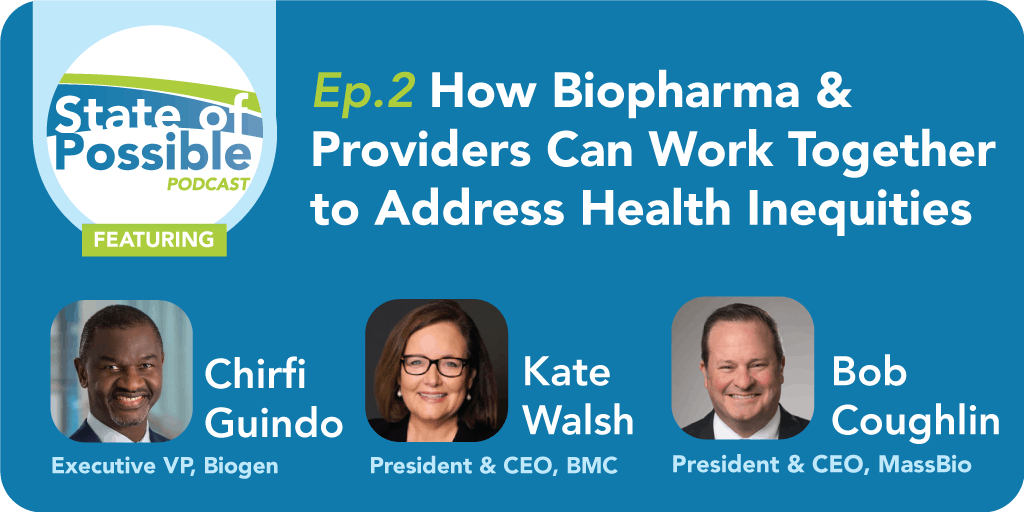
The COVID-19 pandemic has put a spotlight on health inequities in our country, as minority populations are getting sick and dying at a disproportionate rate. Healthcare and life sciences industries, and organizations like MassBio, are increasingly making health equity a strategic priority to ensure everyone has equal access and opportunity to quality healthcare. But it’s clear there is much work to be done.
That’s why MassBio’s new podcast, the State of Possible Podcast, put the issue front and center. For our October episode, Bob Coughlin, MassBio’s President & CEO, was joined by Kate Walsh, President and CEO of Boston Medical Center Health System (BMCHS), and Chirfi Guindo, Executive Vice President and Head of Global Product Strategy and Commercialization at Biogen, to explore how the biopharma industry and providers can work together to address health inequities.
We started the conversation around the root of health inequities in our country, from a culture of mistrust originating from the Tuskegee Syphilis experiment that began in the 1930s, to the lack access to quality care for minority populations. According to Guindo, this trust deficit is a longstanding issue and there is no magic solution. We need diverse representation within the healthcare workforce, both at biopharma companies and providers and at the leadership levels, to really change this perception. Walsh agreed, noting that as a safety-net hospital, the COVID-19 pandemic has disproportionately impacted BMC’s patients, serving as a current example of just how prevalent these health inequities are in the U.S. However, she argued that institutions like BMCHS have an incredible opportunity to improve this reality since the organization works hard every day to earn the trust of minority populations through their long-standing commitment to caring for Boston’s most diverse residents.
Before COVID-19, 50% of BMC’s discharges were patients of color, and 10% of patients in BMC beds were homeless – a percentage that rose to 80% and 18%, respectively, during the pandemic. According to Walsh, COVID-19 made them step back and ask how we can address these root causes. It became clear that we can all do better to involve patients earlier in the process, and to stop making assumptions about why people do what they do. It’s so much more complicated than not wanting to take time off work to participate in a clinical trial. Patients can’t worry about their health if they don’t have a roof over their head, argued Walsh. How we engage patients earlier on in study design, considering their specific needs, while also recognizing that the organizations that serve minority populations are often under-resourced is no small task. So, what can we do?
Access to clinical trials is a major component of health inequity that our industries can take the lead on addressing. A clinical trial should be representative of the patient population, but we know this isn’t always the case, as there are real barriers to accessing these trials and to diversifying the participants. According to Guindo, “There is a tension between the urgency with which we develop programs and the need to have diversity.” While we all agree it is important, it takes more work, and the incentives are not quite aligned. Do we sacrifice the speed in which we’re developing therapies to find more diverse participants? The simple answer is yes – but nothing in the drug development process is simple. Back to Guindo’s earlier point, it takes having diverse frontline workers to do it right, including clinical research teams and people who are interacting with the providers and the patients.
That’s where institutions like BMCHS come in again, since these organizations already have a long history of building trust with these diverse and underrepresented patient populations. Biopharma needs to take advantage of these relationships, and not just round up the usual subjects for clinical trials. “We need to find willing partners on the life sciences side who will take a risk and work with us,” said Walsh. She recognized that BMC must also do better to make sure their patients are represented in clinical trials. Fortunately, we’re at an inflection point where it seems there’s a true commitment to do just that. To Kate’s point, the industry came out of the COVID-19 surge and into Black Lives Matter. We cannot let go of this momentum and the incredible collaboration we’ve seen during the pandemic.
MassBio is committed to being part of the solution and to push on our members, who represent both the biopharma and provider side, to use 2020 as a catalyst to create lasting change. We must double down on our commitment to diversifying the life sciences workforce, and share the good work that Biogen, BMC, and others are doing to address the very disparate needs of patients – from housing to food to health. “We need to go beyond curing disease to promoting health and promoting equity – and that includes human health and also environmental health,” said Guindo.
Recognizing that the speed in which we were able to get clinical trials off the ground for vaccines is the result of decades of research and experience, we must take this same long view to health inequity. “We have a long way to go but I think our commitment is the fuel to accelerate our desire to diversify clinical trials and really address health disparities in our country,” said Walsh.